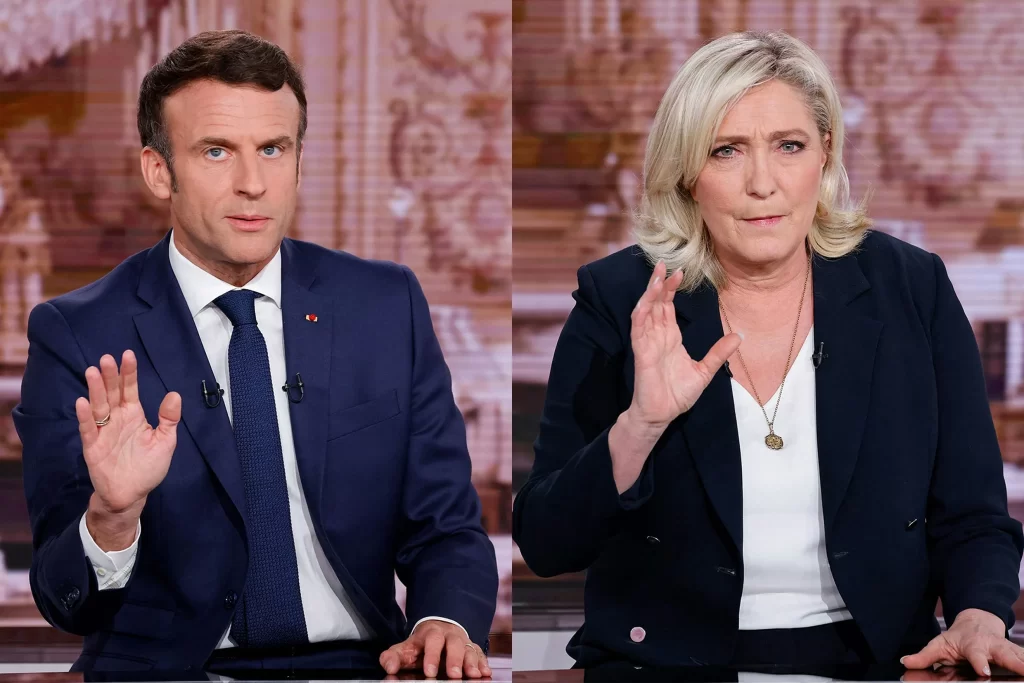
By Tommaso Rabitti, Third-year International Relations student at King’s College London and Editorialist at Res Publica
Macron and Le Pen once again reached the second round, and their rivalry is set to become a staple of French politics. The only thing that hasn’t changed in the last five years is the names on the ballot.
Macron vs Le Pen is only the façade. The issues at play are populism, nationalism, and the creation of a modern state. This election saw the consolidation of Macron’s unique brand of populism. A popular, one-size-fits-all approach that successfully combined institutional credibility with a broad ideological appeal.
A few thoughts on populism, the main protagonist of these elections. Arguably a crucial part of the electorate that renewed Macron’s stay in the Élysée was made up of people who did not vote for him in the first round. Indeed, as Macron himself acknowledged in his victory speech on Sunday night, many voted for him not because they supported his ideas but simply, even reluctantly, to prevent Le Pen from winning. The fear of the ‘extreme right’ taking over is what drove many French citizens not to vote for Macron per se, but to vote for whoever was not Le Pen.
More than the ‘extreme right’, however, Le Pen is first and foremost a populist. Her views on the economy are often very left of centre, while her social policies are traditionally right-wing. The marriage of what was a traditionally left-wing ‘big government’ and greater welfare with more right-wing social values and nationalist rhetoric has been the success story of modern populists all over the world. Le Pen is no exception. From Salvini to Orban, the rise to power of European populists is commensurate with how much they can exploit this strange yet terribly alluring dichotomy.
Why, then, despite gaining more votes than five years ago, has Le Pen lost again? Her populism, formidable as it may be but nowadays quite established, has not brought her to victory because, unlike many fellow European populists who won by defeating traditional parties, she was up against a different kind of populism: Emmanuel Macron. In some real sense, Macron’s party is a modern experiment closer to populist ideological amalgams than it is to traditional parties.
Le Pen’s populism is fairly straightforward: the people vs the elites. Since 2016, this brand of populism has become commonplace. Macron instead relies on a less overt type of populist discourse. It is a popular discourse because it remains sufficiently vague; it offers a flavour for everyone.
Although popularity does not have to imply a populist discourse, successful populisms often rely on popular arguments. By which I mean Macron is able to feel the pulse of the public opinion and tailor his aims accordingly — as was the case with the recent turn towards climate policy. His party, La Republique En Marche, while not explicitly populist purports to be centrist in an age when real centrism appears extinct. Indeed, Macron often defines himself as anti-populist. His success hinges on the fact that ultimately, he tells everyone what they want to hear. Acting on the core populist logic of ideological incoherence in the name of pragmatism, he skillfully declares his support of all causes, even if these are sometimes contradictory. This is why it has been so easy for him to gather votes from opponents when it came to the second round. Because everyone can find a piece of their agenda in Macron’s speeches. For instance, his campaign manifesto pledges policy action on a wide range of diverse matters that will inevitably require a prioritization, which is left unspecified. The manifesto commits to everything from increased police presence, additional military spending, fighting radical Islam and Universal National Service, all the way to green economy investments, full employment targets and greater social cohesion.
The international dimension also played a significant part in this election. The impact of foreign affairs can be seen as a tipping point that took traction away from more extreme candidates such as Zemmour and redirected the spotlight towards Macron. It is worth exploring the role that the unprecedented Russian invasion of Ukraine played in the Presidential campaign. Fears of international instability, renewed faith in European defence and Le Pen’s alleged ties with Putin and her vocal support of Russia may have contributed to swaying the tide in Macron’s favour. Macron’s proactive diplomacy, especially in the early stages of the conflict, and his willingness to try and lead a common response at the EU level boosted his credibility in the eyes of the people.
While it may seem trivial and perhaps a truism, if you are already a President, it helps you to look ‘presidential’. Macron found himself in the position that not many politicians running for re-election have: the possibility to leverage their authority and prestige as incumbents, whether purposefully or not, to strengthen their ethos in the eyes of the electorate and present themselves as the obvious choice. In this regard, the aesthetics of looking presidential were pivotal in helping Macron seeing as he is the first re-elected President in France for many years. This is because previous Presidents lacked the opportunity to look presidential enough. In fact, the conflict in Ukraine inevitably raised the stakes and allowed Macron to assume greater responsibilities and international recognition. Russia’s brutal and unjustifiable invasion of Ukraine was a stark reminder, in crude political terms, of who was commander-in-chief of the armed forces, and who had the international presidential experience required. What this amounted to was a stockpile of legitimacy that was thrust onto Macron quite suddenly as the conflict in Ukraine began. An element that was not present in previous French elections.
The French election reminds us that we are still in the age of populism. Yet increasingly, issues such as abstentionism, the shaping of a new international order, and the importance of climate change policy will be unavoidable.